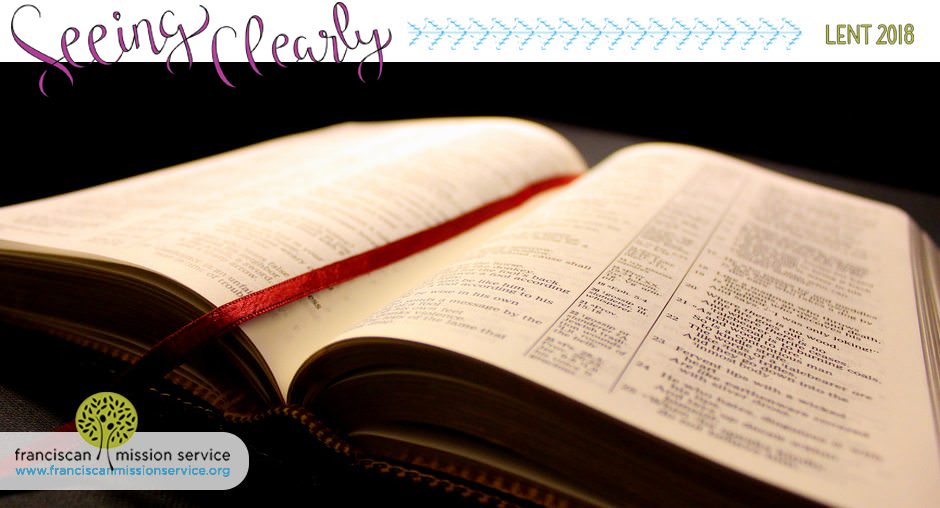Seeing Clearly: Reading the Word

Editor’s note: Thomas Piolata, OFM Cap. is an FMS formation presenter and close friend to the FMS community. As a guest blogger for our Lenten blog series, Br. Tommy analyzes how we are saturated with information—as members of the social media generation—constantly seeking to learn more things, know more facts, and understand more deeply. Yet, he concludes, the only thing we need in order to see clearly is the Word of God, found through prayer.
In his Leslie Stephen Memorial Lecture delivered at Cambridge in 1985, George Steiner spoke words that both then and—even more so—now touch upon something so characteristic of the contemporary milieu: “Political rhetoric, the tidal mendacity of journalism and the mass media, the trivializing cant of public and socially approved modes of discourse, have made of almost everything modern urban men and women say or hear or read an empty jargon, a cancerous loquacity.”
Has this cancerous loquacity effectively diminished being by truncating the human capacity to see deep into the depths of the world in which we live, depths that ultimately bespeak the Divine Creator (cf. Rom 1:20; Ps 19:1-5)? After all, “empty jargon” cannot unveil reality. Do the words of St. Bonaventure, then, mean anything today? “For all creatures speak of God. What shall I do? I shall sing with them all.” Or what about the pithy wisdom of G. K. Chesterton? “Mysticism, or a sense of the mystery of things, is simply the most gigantic form of common-sense.” To see clearly, as Chesterton here suggests, means seeing the great mystery that underlies all that is. In stark contrast to this mystical take, the contemporary mind struggles to see clearly anything at all without technological spectacles colloquially called smart-phones.
The irony is almost humorous: the tsunami of words—read: cancerous loquacity—that drench our daily experience do not suffice to penetrate through the sensual and so offer a glimpse into the metaphysically symbolic structure of the world in which we live. Indeed, in the final analysis, permutations of words will always fall short of revealing what only the Word—through whom “all things came to be” (John 1:3)—can. The Word is the dictionary, so to speak, that makes possible reading the world rightly. Hence can St. Bonaventure say with confidence: “If, therefore, you understand the Word, you understand all things knowable.” The Word breaks open reality. And not just the world in which we live, but the Word—incarnate—shows us the face of the Father, too.
As a Capuchin, I am asked to commit time to mental prayer every day. In the final analysis, I have become utterly convinced that prayer is the key. To read the world rightly entails that we become men and women of prayer, men and women who turn in a dialogical manner toward the Word. In this way, the Word becomes not only our focus, but the Word grants us focus so that we can see clearly the world in which we live. And thence can we enter into the world not as men and women contributing to the cancerous loquacity of the modern tongue, but as men and women of the Word: of Him who is the Prince of Peace, of Him who is “the way, the truth, and the life.”
It is, without question, contrary to the contemporary mind to think that silent prayer is the key to seeing things clearly. But when asked how to pray, Jesus taught the Our Father. He effectively invited his disciples into his personal relationship with the Father, his Father who is our Father. In this way, he invited us into the relational space of the Word, the very same Uncreated Word through whom and for him “all things were created” (Col 1:16). Prayer, in other words, effects the transition into the filial space of the Son who is the Word, the very source of the world’s intelligibility. That means, then, that I cannot read the world—no matter the words—without the Word.
Seeing things clearly. A noble enterprise, to be sure, but one that, in the final analysis, takes place on one’s knees: falling in love in prayer with the Lord.
Reflection question: How is God calling you to deeper reflection of His Word in prayer?
Tagged in:
